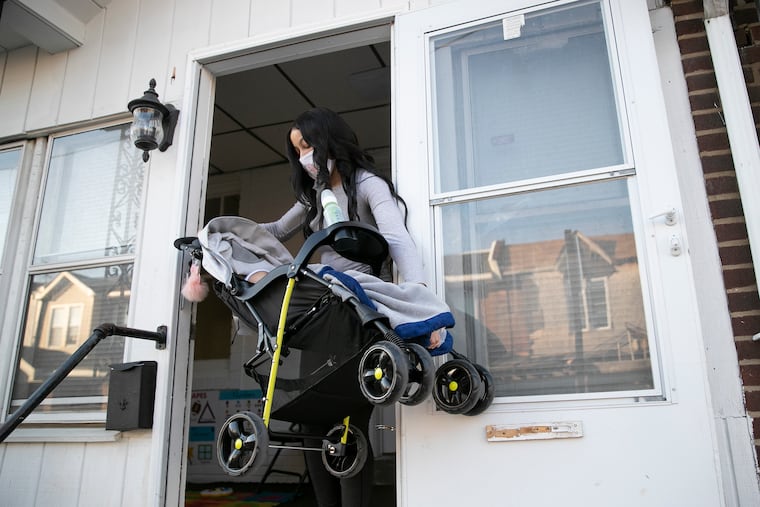Ease the overwhelming burden on families during pregnancy and early parenting | Opinion
All too often, the physical limitations and scheduling demands of pregnancy result in our clients’ job loss because their employers fail to provide flexibility, even when mandated by law.

Like many other parents this past year, Teneema Tibbs delivered a baby while under enormous financial hardship and while also being overlooked by pandemic relief programs. As public interest lawyers, we represent pregnant and parenting people who face challenging systemic barriers to raising healthy children. As The Inquirer recently reported, Teneema, who is one of our clients, was five months pregnant when she lost her job at a day care just before COVID-19 became a nationwide emergency.
While COVID-19 heightened existing hardships, pregnant and parenting people experiencing poverty have long faced impossible dilemmas. All too often, we witness the physical limitations and scheduling demands of pregnancy resulting in our clients’ job loss because their employers fail to provide needed flexibility, even when mandated by law. Even for those with a job to return to, some mothers who have delivered a baby in Pennsylvania, a state with no paid family leave, feel forced to return to work within weeks out of dire financial necessity. Seeking to return, our clients are usually placed on a waitlist for child-care subsidies, without which they cannot begin earning again. Competing stressors, including the necessity of returning to work while still recovering or without safe child care and the need to feed, clothe, diaper, and safely house a baby, can lead to significant toxic stress.
» READ MORE: Many pregnant workers and new mothers were left out of COVID-19 aid
Too often, income losses before and after delivery also lead to utility shutoffs, debt collection, and eviction. Compounded by racial bias in health-care delivery, these stressors can have devastating consequences for maternal-infant health and bonding. Pregnant people’s experience of eviction, particularly during the second and third trimesters, is linked to increased rates of premature birth, low birth weight, and infant mortality. At its most stark, the U.S. has the highest maternal mortality rate among industrialized nations overall, with rates that are 2.5 times higher for Black women than white women. In Pennsylvania, maternal mortality rose more than 21% between 2013 and 2018, with Black women suffering a disproportionate percentage of pregnancy-associated deaths.
Our current state and national policy choices virtually ensure an overwhelming burden for low-resourced families during pregnancy and early parenting. We have seen some progress. The American Rescue Plan, which President Joe Biden signed into law, expanded the Child Tax Credit and gave states the option to extend Medicaid eligibility to one year after a person gives birth. In addition, the U.S. House of Representatives passed the Pregnant Workers Fairness Act (HR 1065), now awaiting Senate action, which requires workplaces to provide workers with reasonable accommodations related to pregnancy and childbirth so long as those accommodations do not present an undue hardship on the employer. If passed, President Biden’s American Families Plan promises dramatic federal investments in paid family leave, child care, and educational opportunities, among other key supports.
But more can — and should — be done to address the issue in Pennsylvania.
» READ MORE: Free Britney, and all people, from reproductive coercion | Opinion
In Pennsylvania, similar bills that would protect more workers have long been dormant because leadership in the state legislature has not prioritized the needs of families. The Pennsylvania legislature must pass the state-level Pregnant Workers Fairness Act (HB 990/SB 716), as well as the Family Care Act (HB 1200/SB 580), which would establish a statewide paid family and medical leave insurance program. Additionally, other pending bills would address maternal mortality and systemic racism in health care, including by adding maternal deaths and severe maternal morbidity to the list of reportable events to the state (HB 1174/SB 358), extending Medicaid coverage to doula services (HB 1175/SB 360), extending pregnancy-related and postpartum Medicaid coverage (HB 1173/SB 359), and requiring training to address implicit bias and cultural competency in health care (HB 1176).
There is so much the state legislature can do to dismantle the barriers Pennsylvanians face when trying to provide for and raise healthy families. As new policy approaches are considered in light of a pandemic that laid bare our country’s persistent health disparities, we must enact legislation to address the needs of pregnant and parenting people.
The time to act is long overdue. Contact your legislators in the Pennsylvania General Assembly to tell them how important it is to act on these measures.
Amal Bass is director of policy and advocacy at the Women’s Law Project. Susanna Greenberg is managing attorney at HELP: MLP (The Health, Education and Legal assistance Project: A Medical-Legal Partnership). Women’s Law Project attorney Margaret Zhang and HELP: MLP attorney Rachel Mark contributed research to this piece.